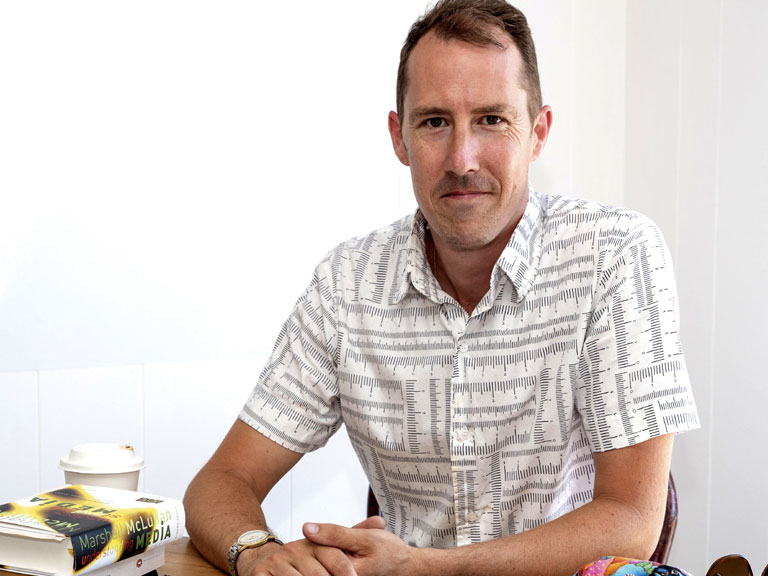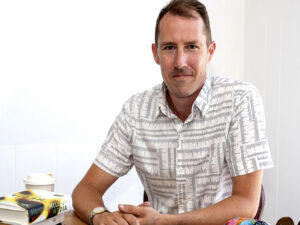County News
The McLuhan Institute

Pop-up in Wellington looks at intersection of culture and technology
Marshall McLuhan was one of the towering intellectuals of the 20th century. His ideas on the roles of technology and media in modern culture have influenced two generations of thought, and those ideas are even more relevant in this era of near-instant communication and non-stop information. To make sense of these ideas and place them in a modern context, Marshall’s grandson, Andrew McLuhan, has created the McLuhan Institute. Andrew is a County resident and he started the Institute three years ago to continue the work of his father, Eric McLuhan, and his grandfather in their tradition. Until now, the Institute has been more of an online presence, with Andrew giving lectures or classes from grade school level to university level. Last Saturday, Andrew opened the McLuhan Institute Satellite at 291 Main Street in Wellington, establishing more of a real presence. “This is a way for me to have some kind of presence in the community, to start to tell people that I am here, what the McLuhan Institute is, who Marshall McLuhan was, to educate and to entertain to a certain extent, and to engage in a kind of mutual exploration,” said Andrew. The location was somewhat of a serendipitous find for Andrew. He was in an adjacent suite for a COVID-time haircut, when such places were allowed to reopen, and noticed this space was available for rent, and leapt at the opportunity. “I imagined opening up a satellite venue in order to bring the McLuhan message to the community, which I didn’t think I would be able to do in a more formal building for the institute for several years,” he said. The long-term plan is for Andrew to convert a twostorey barn at his home in the County to house the McLuhan Institute, a project that is several years away from being realized. Andrew believes that the County location is ideal, as it is located midway between the McLuhan Centre in Toronto—home to Marshall’s archives—and Eric McLuhan’s work in Ottawa.

Andrew McLuhan at the pop-up McLuhan Institute Satellite in Wellington. He welcomes visitors wishing to learn about the work of Marshall and Eric McLuhan, his grandfather and father, about how media technology shapes society and culture.
The rise of Marshall McLuhan’s work deftly illustrates the power of the media. Marshall taught English literature at St. Michael’s College and was regarded as a leading expert in modernist poetry. In the 1950s, he started looking at communication and culture and the effect of technology on society, and he published his book Understanding Media in 1964. He was contacted by Howard Gossage, an advertising agency owner from San Francisco, who decided that Marshall’s message needed to reach a wider audience, and set out to see if he could make Marshall a celebrity. He took Marshall to New York City, and got magazine writers to start writing about Marshall’s book. “And it somehow took off,” said Andrew. “The other half of the equation was that Marshall was very witty and quick on his feet and he was able to take that attention and hold it. So almost overnight it seems that Marshall became a household name and ‘The medium is the message’ was everywhere. This was in the mid-’60s, so for the rest of the ’60s and into the early ’70s Marshall was really well known around the world and sought after as a consultant and speaker.” Eric started working with Marshall around this time, continuing after Marshall’s death in 1980 for almost another four decades until his passing in 2018. “My father wasn’t a spotlight kind of guy. He preferred to work in his office,” said Andrew. “He would go and give talks, and for the past 10 years I travelled with him as his assistant, but he really preferred to be at home, doing the work.”
Andrew said that it is more important than ever to understand the consequences of technology on modern culture, and to take more control over it. “When we create a technology like the smartphone, it quickly becomes an inseparable part of the environment. It shapes the way we interact with each other, and it shapes the way society is organized,” he said. “Because there are more people on the planet, and because the technology is advanced, it is necessarily more consequential. And that is why I focus on the practical tools that Marshall and Eric developed in order to understand the nature of technologies. My goal at the McLuhan Institute bring these tools to the general public, because these tools have been kept inside academia for a long time. Advertising and marketing have made use of them, but I think it’s the regular people who need to understand the effect of technology on our lives.” Andrew said that so far technology companies have not fully considered the effects of their products on the well-being of consumers. “Technology companies should have some regulations beyond the very superficial of making sure the emissions from your cell phone don’t fry your brain. How about, you know, the anxiety and fear of missing out, which is a direct side effect of notification and the way cell phone apps are engineered to occupy your attention.”
Andrew said that the McLuhan Institute Satellite is for those people who are curious about who Marshall McLuhan was, what media studies are, and what “The medium is the message” means. He has a list of short lectures that he is able to give on a one-on-one basis, and he has vintage McLuhan books, magazines and newspapers for purchase. He also has an adult take on the “surprise packs” that kids used to buy at variety stores—those brown paper bags that contained candies, a toy and maybe some stickers. He has asked artists to send him a package containing an artwork, which he will offer for sale, unopened. “The idea behind this is to invoke that sense of curiosity and wonder, of surprise and delight. Over the next couple of weeks those things are going to start coming in, and people can choose to take a gamble on them. I’m not going to know what’s in them, so it’s ‘buyer beware’. Hopefully they will open it in front of me so I can find out. It’s a bit of a social experiment.” The McLuhan Institute Satellite is located upstairs at 291 Main Street in Wellington. Please visit themcluhaninstitute.com for more information.

Comments (0)